
The 1971 Austrian Grand Prix was a Formula One motor race held at Österreichring on 15 August 1971. It was race 8 of 11 in both the 1971 World Championship of Drivers and the 1971 International Cup for Formula One Manufacturers. The 54-lap race was won by BRM driver Jo Siffert after he started from pole position. Emerson Fittipaldi finished second for the Lotus team and Brabham driver Tim Schenken came in third. This was the debut race of the future world champion Niki Lauda.

The 1971 Italian Grand Prix was a Formula One motor race held at Monza on 5 September 1971. It was race 9 of 11 in both the 1971 World Championship of Drivers and the 1971 International Cup for Formula One Manufacturers.

The 1974 Argentine Grand Prix was a Formula One motor race held in Buenos Aires on 13 January 1974. It was race 1 of 15 in both the 1974 World Championship of Drivers and the 1974 International Cup for Formula One Manufacturers. The 53-lap race was won by McLaren driver Denny Hulme after he started from tenth position. Niki Lauda finished second for the Ferrari team and his teammate Clay Regazzoni came in third.
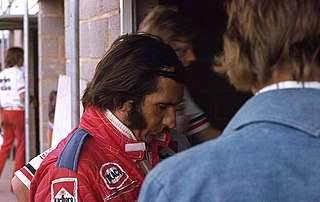
The 1974 Formula One season was the 28th season of FIA Formula One motor racing. It featured the 1974 World Championship of F1 Drivers and the 1974 International Cup for F1 Manufacturers, contested concurrently over a fifteen-race series which commenced on 13 January and ended on 6 October. The season also included three non-championship races.

The 1972 Formula One season was the 26th season of the FIA's Formula One motor racing. It featured the 23rd World Championship of Drivers, the 15th International Cup for F1 Manufacturers, and numerous non-championship Formula One races. The World Championship season commenced on 23 January and ended on 8 October after twelve races.

The 1971 Formula One season was the 25th season of the Fédération Internationale de l'Automobile's Formula One motor racing. It featured the 22nd World Championship of Drivers, the 14th International Cup for F1 Manufacturers and a number of non-championship races open to Formula One cars. The World Championship was contested over eleven races between 6 March and 3 October.
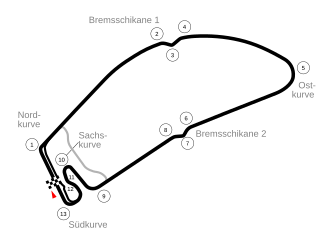
The Jochen Rindt Memorial or the VI Rhein-Pokalrennen was a motor race, run to Formula One rules, held on 13 June 1971 at the Hockenheimring, Germany. The race was run over 35 laps of the circuit, and was dominated by Belgian driver Jacky Ickx in a Ferrari 312B.
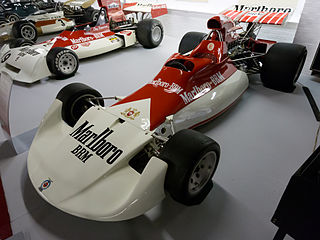
The BRM P180 was a Formula One racing car, built by BRM and designed by Tony Southgate which raced in the 1972 Formula One season. It was powered by a BRM 3.0-litre V12 engine. One of the main features of the P180 was that the radiators had moved to the rear of the car, allowing the nose of the car to be very wide and flat. It competed in five World Championship Grands Prix, with a total of seven individual entries. The car scored no World Championship points, its best finish being eighth at the 1972 Italian Grand Prix.
The Brabham BT48 was a Formula One racing car designed by Gordon Murray and raced by the Brabham team. The car, powered by a 12-cylinder Alfa Romeo engine, competed in the 1979 Formula One season. The intended plan was to run the BT47 but the FIA outlawed it because it had a Chaparral 2J-type box rear end with twin variable geometry fans on the rear to maximize ground effect, so Murray designed the BT48 instead.
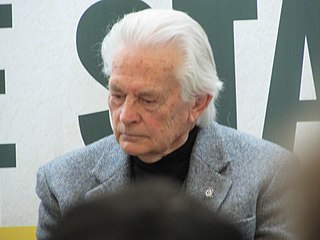
Tony Southgate is an English engineer and former racing car designer. He designed many successful cars, including Jaguar's Le Mans-winning XJR-9, and cars for almost every type of circuit racing. He was responsible for the chassis design of Ford's RS200 Group B rally car. Southgate was employed as chief designer or technical director for many Formula One teams for over twenty years. These teams included BRM, Shadow and Arrows. Southgate retired after producing the Audi R8C, which was a major influence in the Bentley Speed 8, which won Le Mans in 2003. He continues to be a regular visitor to current and historic race meetings.

The Matra MS120 was the sixth and final Formula One car produced by Matra.

The Tyrrell 002 is a Formula One racing car which was designed for the 1971 and 1972 Formula One seasons by Tyrrell's Chief Designer, Derek Gardner. It was essentially the same design as the Tyrrell 001, but incorporated some detail changes, and 002 were built with longer monocoques, as François Cevert was taller than Jackie Stewart.

The BRM P201 is a Formula One racing car built by British Racing Motors and designed by Mike Pilbeam, which raced in the 1974 and 1975 seasons and in P201B specification in 1976 and 1977. The P201 featured a triangular monocoque, hip-level radiators, outboard front springs and inboard brakes. It used a 3.0-litre V12 engine and competed in 26 races, making 36 individual entries in total. Its best finish was second place for Jean-Pierre Beltoise at the 1974 South African Grand Prix, on the car's debut.

The Williams FW was a Formula One car used by Frank Williams Racing Cars during the 1973, 1974 and 1975 seasons. It was designed by John Clarke.
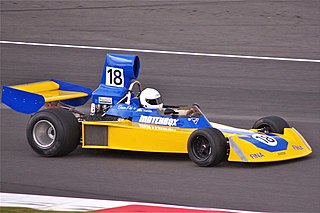
The Surtees TS16 was a Formula One car used by Surtees during the 1974, 1975 and 1976 Formula One seasons. It was designed by John Surtees.
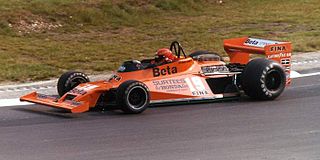
The Surtees TS20 was a Formula One car used by Surtees during the 1978 Formula One season. It was designed by John Surtees and Ken Sears.

The Surtees TS14 was a Formula One car used by Surtees during the 1972 and 1973 Formula One seasons. It was designed by John Surtees.

The Surtees TS19 was a Formula One (F1) car used by Surtees during the 1976, 1977 and 1978 F1 seasons. It was designed by John Surtees and Ken Sears.
The Parnelli VPJ4 was a Formula One racing car designed by Maurice Philippe, and used by Vel's Parnelli Jones Racing during the 1974, 1975 and 1976 Formula One seasons.
The BRM V12 engine is a V12 Formula One racing engine, designed, developed and built by British manufacturer and constructor BRM, between 1967 and 1977.

















